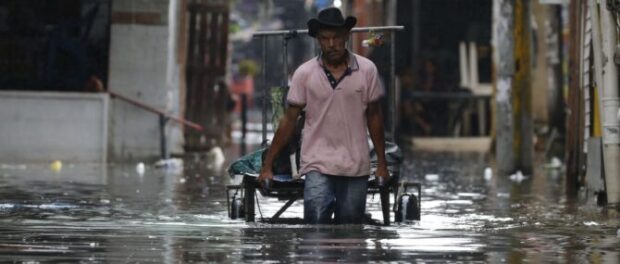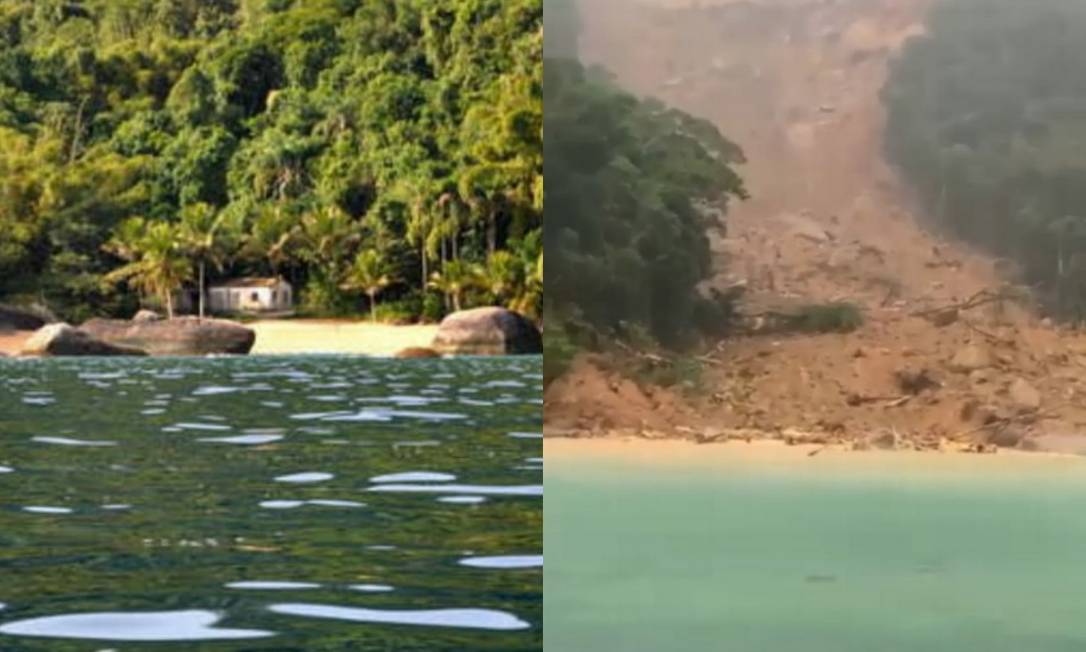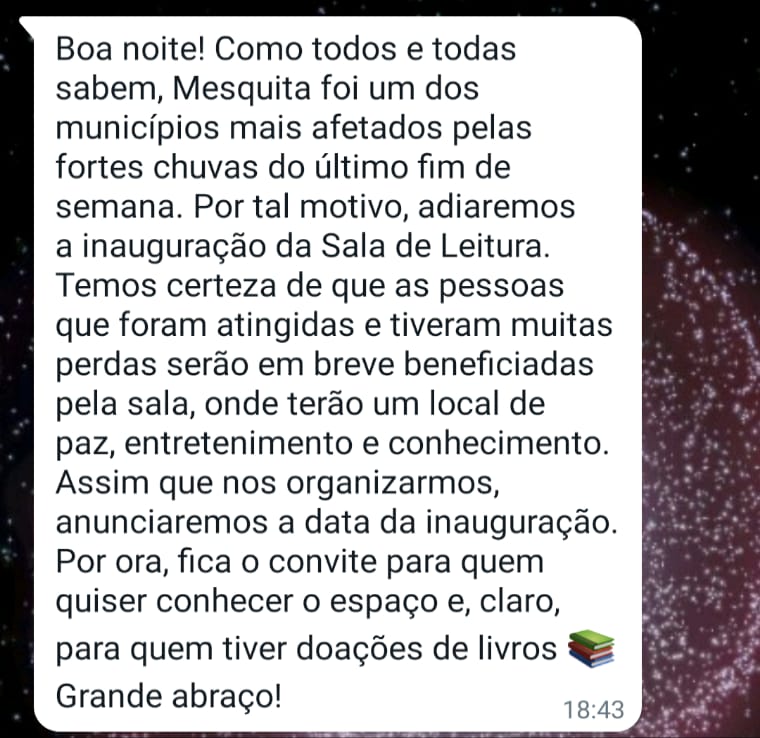
 This article is part of RioOnWatch’s #VoicesFromSocialMedia series, which compiles perspectives posted on social media by favela residents and activists about events and societal themes that arise. It is also part of a series created in partnership with the Behner Stiefel Center for Brazilian Studies at San Diego State University, to produce articles for the Digital Brazil Project on climate impacts and affirmative action in the favelas for RioOnWatch.
This article is part of RioOnWatch’s #VoicesFromSocialMedia series, which compiles perspectives posted on social media by favela residents and activists about events and societal themes that arise. It is also part of a series created in partnership with the Behner Stiefel Center for Brazilian Studies at San Diego State University, to produce articles for the Digital Brazil Project on climate impacts and affirmative action in the favelas for RioOnWatch.
The month of April started with heavy rains across the entire state of Rio de Janeiro. In Angra dos Reis, a city on Rio’s Costa Verde coastline, 800 mm of rain fell in 48 hours. Almost half of the expected rainfall for an entire year fell in three days. According to the National Center for Monitoring and Early Warning of Natural Disasters (CEMADEN), this is an unprecedented level of precipitation. In the coastal city of Paraty, the downpour also left a trail of destruction, with people’s homes destroyed and electricity supplies cut off, not to mention landslides that caused changes to the landscape of beaches and hills.

Historically, in Brazil urban peripheries are the areas that suffer most due to the negligence of public authorities, who do not guarantee the necessary sanitation policies to prevent accidents. In the Rio de Janeiro Metropolitan Area’s Baixada Fluminense region, a portrait of this disregard, the Instagram account of Nova Iguaçu Depressão covered devastation caused by the storms in the Nova Iguaçu and neighboring Mesquita municipalities in real time. Most of the municipalities of the Baixada Fluminense declared a state of emergency. Residents are fed up with this recurring situation, as shown through #VoicesFromSocialMedia.
Baixada Fluminense Sunken in Chaos
As soon as the first raindrops fell on Rio, images of the devastation were being shared. Baixada Fluminense residents faced a difficult evening on Friday, April 1, and woke up to the damage left by the rain. The Nova Iguaçu Depressão Instagram account shared images of workers returning home by bus, with water threatening to flood the vehicle.
Ver essa foto no Instagram
Chaos in Nova Iguaçu: It’s been 1h20 and the rain hasn’t stopped falling.
Image: Gabriel Rocha.
Teacher and activist Rose Cipriano shared a video from the municipality of Belford Roxo on Instagram. She used the post to denounce the negligence of public authorities, who she considers responsible for recurring disasters.
Ver essa foto no Instagram
We are being continuously punished, not by the rain, but by the negligence of the authorities, who don’t invest in solving the problems that affect us. We always say that we are capable of preventing tragedies like this one, and it’s unforgivable that residents keep paying the price for the poor administration of public resources. We need to fight and demand answers but, while we wait, we need to protect ourselves. If you live in an area at risk [of flooding], stay alert; if you live in a safe place, avoid leaving home and offer your support to others.
We are stronger if we stay alive!
Stay safe!
Rio must change!
Source: Baixada Viva, Belford Roxo
#changerio
#stopkillingus
#rain
#neglect
According to the Destaque Baixada newspaper, more than 300 people were displaced in Belford Roxo. The newspaper also reported the collapse of six structures, five landslides and 25 people left homeless in the municipality. City Hall declared a state of emergency.
Ver essa foto no Instagram
Last Friday’s storm caused the collapse of six structures and five landslides and left 25 people homeless and more than 300 displaced in Belford Roxo, Baixada Fluminense.
According to City Hall, the following places have been designated as support centers: Ciep Constantino Reis, the Maria Barbosa Daycare Center, Miguel Angelo Leone School (Xavantes), Ciep 377 Carmem da Silva and Geraldo Dias Daycare Center (Heliópolis). City Hall has also created nine spots for collecting donations.
Mesquita municipality was not spared the tragic consequences of the heavy rains. Nova Iguaçu Depressão shared videos of cars being swept away by currents formed in the streets and of passengers stuck in a bus. This was a scary scene to witness, particularly after people were killed in February 2022 when buses were dragged into the Quitandinha River in the center of Petrópolis.
Ver essa foto no Instagram
Mesquita was also badly affected by the storm
Cultural activities scheduled to take place in Mesquita had to be cancelled, as was the case of the city’s Center for Alternative Measures, linked to the local Judiciary, which planned to inaugurate the Carolina de Jesus Reading Room for youth. The event cancellation was communicated by WhatsApp.
Good evening! As you all know, Mesquita was one of the districts most affected by the heavy storms last weekend. For this reason, we are postponing the inauguration of the reading room. We are sure that people who have been affected by the rains and who have lost a lot will soon be able to benefit from the new reading room, which will be a space of peace, entertainment and learning. As soon as we regroup, we will let you know the new date. For now, everyone is invited to check out the space and book donations are welcome. A big hug to all!
The results of the storm were easier to see the next day. Activist Wesley Teixeira shared photos on his Instagram account showing the situation in Belford Roxo. The images showed residents standing with water up to their chests, holding onto ropes and wires in order not to be dragged away by the water.
Ver essa foto no Instagram
Today I wanted to start the day with a motivational message for you, but instead I saw these pictures from the weekend; they are photos from Belford Roxo, Baixada Fluminense, and present a perfect image of the indignity that poor people in our state are faced with.
Rainy days are always terrible for people living in the periphery. It’s important to say that as long as public funds are not adequately allocated to prevention, social housing programs and environmental education, poor people are going to keep suffering and losing a lot of what they have.
It can’t be said enough: we need a political commitment to climate change. The blame for these tragedies doesn’t lie with Saint Peter but rather with irresponsible government administrations.
We need efficient funding to fight this environmental negligence that keeps on humiliating, exposing, and killing us!
Using the hashtag #FloodinginBaixadaFluminense, the Fórum Grita Baixada profile shared photos of the Botas River, located on the outskirts of the municipality of Nova Iguaçu, showing a swollen river with lots of floating garbage. In the post, the Forum stated that the flood was not an isolated event, declaring it to be a recurring consequence of environmental racism.
Ver essa foto no Instagram
#FloodinginBaixadaFluminense. The flooding of the Botas River in Moquetá, on the outskirts of Nova Iguaçu, is just one example of lacking environmental policies. The quantity of garbage thrown into our rivers added to the worsening of global climate change impacts mostly on people who are black, poor and peripheral. This is not an isolated event. It’s the consequence of a lack of political will to ensure that episodes like this don’t ever happen again. But we know what to call it: ENVIRONMENTAL RACISM.
Solidarity Campaigns
“By Us for Us” is a philosophy born out of the need to survive when marginalized groups realize they can only count on themselves for support. When faced with complete abandonment, the residents of peripheries understand that the way out of the challenges imposed by the system is mutual collaboration. It was no different when faced with these latest floods and landslides. As soon as the damages began to be tallied, campaigns to support the people affected were already being set up.
Espaço de Cria is a grassroots education project based in Nova Iguaçu, specifically in the neighborhood of Caioaba. The project’s building was also damaged by the rains, leading to the creation of Mobiliza Caioaba, a campaign to help the families of students served by Espaço de Cria.
Ver essa foto no Instagram
Last night, many families living in Caioaba, in Nova Iguaçu lost absolutely EVERYTHING!
Espaço de Cria is organizing a special campaign to help: our students are in the same situation.
Please share this post. The situation is very precarious. People need clothes, appliances, food, water. Some people’s houses are still flooded.
We are only going to be able to deal with this situation if we act collectively!
To donate money, contact bmgomes94@gmail.com
To help us clean our space and provide direct support to other families, send us a direct message.
We are taking clothing donations!
To start with, we are going to focus on products that are on our list, and then increase our support later, if possible!
Metropolitan advocacy organization Casa Fluminense also shared a series of different initiatives, mostly aimed at municipalities in the Baixada Fluminense. In a post, Casa Fluminense remarked that extreme weather events like torrential rains are happening more frequently and that it is critical to be prepared. The organization made it clear that it is a political choice to have lives constantly lost due to the lack of public policies and urban infrastructure.
Ver essa foto no Instagram
Solidarity campaigns to help the cities hit by the rains in the state of Rio.
Last weekend, Rio de Janeiro once again experienced heavy rain across most of the state. Looking at the municipalities in Rio’s metropolitan region, Nova Iguaçu declared a state of emergency on Friday, April 1 and was also the area that registered the largest number of people displaced. Besides Nova Iguaçu, cities like Mesquita and Belford Roxo, and neighborhoods in Rio de Janeiro’s West Zone, also experienced flooding.
This is not the first time that torrential rains have caused damage, particularly on the outskirts of Rio’s metropolitan area. Authorities have also known for quite some time of the climate-related impacts on these territories and on the lives of local families, though they seem to prefer not to take action.
Over the years, extreme weather events have become increasingly frequent, with violent storms within and outside Rio’s metropolitan region. This is why it is urgent to demand public policies that improve urban infrastructure and prevent disasters caused by extreme weather events, so that we no longer see people lose everything they own, including their own lives, due to heavy rains like these.
Currently, dozens of families are in need of support, and you can help by donating to one of the organizations listed in this post.
About the author: Euro Mascarenhas Filho is a journalist and contributor to the Piratininga Communication Center (NPC) news service. He is author of the podcast Antena Aberta.

